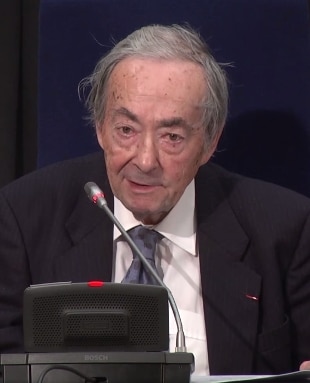Share
February 3, 2020 The writer and essayist George Steiner, a leading figure in international culture for his literary criticism studies, author of innovative moral and religious interpretations, died today in his Cambridge home at the age of 90 . He addressed issues such as the relationship between power, barbarism and ignorance. The announcement of the disappearance was given by his son David Steiner to the online edition of the "New York Times".Author of a vast bibliography of non-fiction, with translations into a dozen languages (in Italian almost all of his volumes appeared by Garzanti), he was an emeritus professor of the Churchill College of the University of Cambridge and previously was a professor in numerous universities including Princeton, Stanford, Chicago, Oxford and Geneva. In many essays he has addressed the paradox of the moral power of literature and its powerlessness in the face of an event like the Holocaust.
Born in Paris on April 23, 1929 to an Austrian family of Jewish origin, who moved away from Austria due to the climate of anti-Semitism that spread in the late 1920s and emigrated to the United States in 1940, Steiner followed his university studies in Europe and the United States. . Steiner was a staff member of "The Economist" in London (1952-56), since 1966 he has replaced Edmund Wilson as a literary critic for the "New Yorker" and has collaborated on the "Times literary supplement". He held numerous academic positions and from 1974 to 1994 he was professor of English and comparative literature at the University of Geneva, where he later became an emeritus professor. In 1994-95 he was first Lord Weidenfeld visiting professor of Comparative literature at the University of Oxford.
Raised in a family where English, French and German were fluently spoken, educated by his father to a deep respect for the classics and for the greats of thought, music, literature and the arts, according to the best traditions of that Central European Jewish environment , whose ruin he witnessed in childhood, Steiner made use of such a heritage for a passionate research on the origins of the crisis of Western European culture.
He published his first book, "Tolstoy or Dostoevsky" (Edizioni Paoline, 1965, Garzanti, 1995). For Steiner, the crisis of culture is identified with the crisis of language: in "Language and Silence" (1967, Rizzoli 1972 and Garzanti 1994) it states the lacerating divergence between signs and meaning and realizes how the corruption of language is linked to lies and ferocity of totalitarianism. This thesis will become central in "In Bluebeard's Castle" (1971, Se 1990), in which the Holocaust is indicated as the cause of the unbridgeable gap between culture and politics (Weimar world and Auschwitz world), and therefore of the end the very concept of progress and the coincidence of progress and culture.
In the following "After Babel" (1975, Sansoni 1984, Garzanti, 1995; adapted for television with the title "The tongues of men", 1977), Steiner proposes to trace the coordinates of a new field of discussion: to bring out the linguistics from the bottlenecks of specializations and synchronic abstractions. In this work, heavily opposed by the dominant linguistic currents in the American academic world, Steiner places translation at the heart of communication: translating is synonymous with communication and communicating means deciphering. Every human communication, even monolingual, is a translation.
Indicating in Babel a symbol not of confusion but of vitality, Steiner sees in the proliferation of languages the human ability to generate alternative realities and therefore to project themselves into the future. The destructive hegemony of the so-called major languages, especially English, thus becomes a component of the massification process and the leveling of Western culture.
Another trend followed by Steiner is that of continuing the myths of classical culture in western culture ("Death of the tragedy, 1961, Garzanti 1965;" Le Antigoni ", 1979, Garzanti 1990). Steiner identifies in the advent of a society now accustomed to horror, and therefore unable to wonder, the cause of the death of the tragedy.
In the intellectual autobiography "Errata" (1997; Garzanti 1998) Steiner claims to have recognized the origins of the decline of Western culture too late in a radical transformation of ontological-historical categories dating back to classical Greek culture. The so-called new era is based on a culture of the ephemeral opposite to that of duration. Finally, a platonic anarchist declares himself with self-irony, unable to join a political party, but firmly convinced of the need to support any social order capable of diminishing suffering in the world and of giving space to a cultural elite of scientists, artists and philosophers.
Steiener also wrote poems ("Poems", 1953), short stories ("Anno Domini", 1964) and a novel "The trial of San Cristobal" (1981; Rizzoli), which also had a theatrical version, in which it deals with the theme of an underground complicity between victims and executioners.
Other works published by Garzanti include: "True presences" (1992), "The corrector (1992)," No passion off "(1997)," Grammar of creation "(2003)," The lesson of the masters "(2004 ), "A certain idea of Europe (2006)," Ten (possible) reasons for the sadness of thought "(2007)," The books that I have not written "(2008)," Readings. On the 'New Yorker' "(2010 ), "The poetry of thought. From Hellenism to Paul Celan" (2012), "The passion for the absolute. Conversations with Laure Adler" (2014).
Also noteworthy is "The book of books. An introduction to the Hebrew Bible" (preface by Gianfranco Ravasi, Vita & Pensiero, 2012), "The barbarism of ignorance (conversation with Antoine Spire)" (Nottetempo, 2005) and "Nostalgia of the absolute "(Anabasi, 1995, Bruno Mondadori, 2000).

